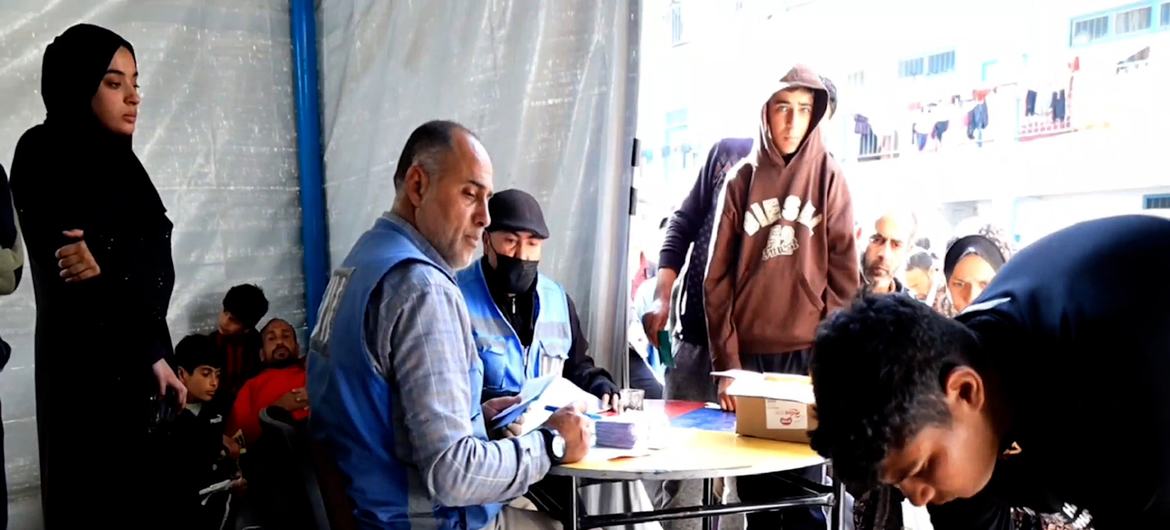
Despite myriad challenges, UNRWA continues lifesaving work in Gaza
UN News/Ziad Taleb | An UNRWA shelter operating at a school in Deir Al-Balah.
United Nations, 15 February 2024
Despite unprecedented challenges, the UN relief agency for Palestine refugees (UNRWA) continues to provide lifesaving supplies and services to more than 1.5 million displaced people in southern Gaza.
Agency employees and volunteers at the UNRWA-affiliated Deir Al-Balah Preparatory School in central Gaza told UN News that despite difficult conditions restricting the movement of workers at many international aid organizations, they continue preparing and distributing food rations.

“People cannot buy any supplies due to their lack [of availability], and even if they are available, they are expensive,” said Youssef Saqr, a support counselor at the school. “We thank UNRWA for the services it provides to people, and we call on everyone to redouble their efforts so that aid continues to reach everyone.”
The school had been turned into a centre for sheltering the displaced following Israeli strikes and bombardment triggered by Hamas’s surprise attack on Israel on 7 October that left 1,200 dead and 240 taken hostage.
Since then, the school-turned-shelter has become home to hundreds of displaced Palestinians fleeing the ongoing violence.
Relief services urgently needed
UNRWA provides diverse and integrated services to the displaced in the shelter centre, Mr. Saqr said, the most important of which are relief aid in addition to health, social and psychological services.
His job focuses on the psychological aspect, he explained, adding that he works to educate families and holds special sessions for children on a daily basis.
Mr. Saqr stressed the urgent need for relief services, noting that the interruption of aid leads to unimaginable suffering in shelters because people depend entirely on the aid provided by UNRWA.

Spread of diseases among children
Supervisor Inaam Rabeh agreed, emphasizing that the aid supplies that arrive at the school are insufficient.
Working to provide health and social services at the Deir Al-Balah centre to people with special needs and the elderly, she warned that dangers were on the rise.
Hepatitis and other diseases have spread widely among children over the past two weeks due to the lack of hygiene supplies, medicines, clothing and blankets, which doubles the suffering of people in the centre, she said.

Delivering aid while facing multiple threats
With the continued bombing and displacement, which also affects UNRWA employees, the agency’s teams are still focused on providing relief in Gaza.
Since the war began, more than 150 UNRWA employees have been killed and dozens of the agency’s headquarters and warehouses destroyed in various parts of the Gaza Strip.
The main arm of humanitarian efforts in Gaza, the agency runs shelters housing more than one million people, providing them with necessary humanitarian relief and primary healthcare.
No other entity has the capacity to provide assistance on the scale necessary to meet the needs of 2.2 million people in the Strip, UNRWA said.

Looming funding cuts threaten services
A number of donors suspended their funding to UNRWA last month following Israel’s allegations of the involvement of 12 agency employees in the 7 October attacks on Israel.
UNRWA quickly fired nine employees due to the seriousness of the allegations and is currently investigating the matter. The UN Office of Internal Oversight Services – the highest investigative body in the organization – is also investigating the allegations.
UN Secretary-General António Guterres has appealed to governments that suspended their funding to UNRWA to reconsider and ensure the continuation of the agency’s critical operations.
If funding for UNRWA is not resumed, the agency said it will be forced to cease its operations across the region – including Gaza – by the end of February. UNRWA serves 5.9 million Palestine refugees in Gaza, the West Bank, Jordan, Lebanon and Syria.
Learn more about the work of UNRWA here.
Donate to the humanitarian response in Gaza
The original article appeared here.